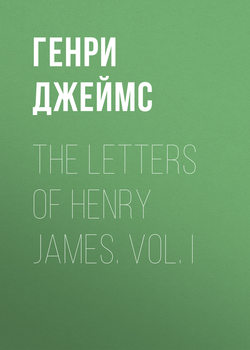Читать книгу The Letters of Henry James. Vol. I - Генри Джеймс, Henry Foss James - Страница 8
I
FIRST EUROPEAN YEARS (1869-74)
To William James
Оглавление'Minny Temple' is the beloved young cousin commemorated in the last pages of Notes of a Son and Brother. The news of her death came to H. J. at Malvern almost immediately after the following letter was written.
Great Malvern.
March 8th, 1870.
Beloved Bill,
You ask me in your last letter so 'cordially' to write home every week, if it's only a line that altho' I have very little to say on this windy March afternoon, I can't resist the homeward tendency of my thoughts. I wrote to Alice some eight days ago—raving largely about the beauty of Malvern, in the absence of a better theme: so I haven't even that topic to make talk of. But as I say, my thoughts are facing squarely homeward and that is enough.... Now that I'm in England you'd rather have me talk of the present than of pluperfect Italy. But life furnishes so few incidents here that I cudgel my brains in vain. Plenty of gentle emotions from the scenery, etc.; but only man is vile. Among my fellow-patients here I find no intellectual companionship. Never from a single Englishman of them all have I heard the first word of appreciation and enjoyment of the things here that I find delightful. To a certain extent this is natural: but not to the extent to which they carry it. As for the women, I give 'em up in advance. I am tired of their plainness and stiffness and tastelessness—their dowdy beads and their lindsey woolsey trains. Nay, this is peevish and brutal. Personally (with all their faults) they are well enough. I revolt from their dreary deathly want of—what shall I call it?—Clover Hooper has it—intellectual grace—Minny Temple has it—moral spontaneity. They live wholly in the realm of the cut and dried. 'Have you ever been to Florence?' 'Oh yes.' 'Isn't it a most peculiarly interesting city?' 'Oh yes, I think it's so very nice.' 'Have you read Romola?' 'Oh yes.' 'I suppose you admire it.' 'Oh yes, I think it so very clever.' The English have such a mortal mistrust of anything like criticism or 'keen analysis' (which they seem to regard as a kind of maudlin foreign flummery) that I rarely remember to have heard on English lips any other intellectual verdict (no matter under what provocation) than this broad synthesis—'so immensely clever.' What exasperates you is not that they can't say more, but that they wouldn't if they could. Ah, but they are a great people for all that.... I re-echo with all my heart your impatience for the moment of our meeting again. I should despair of ever making you know how your conversation m'a manqué or how, when regained, I shall enjoy it. All I ask for is that I may spend the interval to the best advantage—and you too. The more we shall have to say to each other the better. Your last letter spoke of father and mother having 'shocking colds'—I hope they have melted away. Among the things I have recently read is father's Marriage paper in the Atlantic—with great enjoyment of its manner and approval of its matter. I see he is becoming one of our prominent magazinists. He will send me the thing from Old and New. A young Scotchman here gets the Nation sent him by his brother from N.Y. Whose are the three French papers on women? They are 'so very clever.' A propos—I retract all those brutalities about the Engländerinnen. They are the mellow mothers and daughters of a mighty race. But I must pull in. I have still lots of unsatisfied curiosity and unexpressed affection, but they must stand over. Farewell. Salute my parents and sister and believe me your brother of brothers,
H. JAMES jr.
